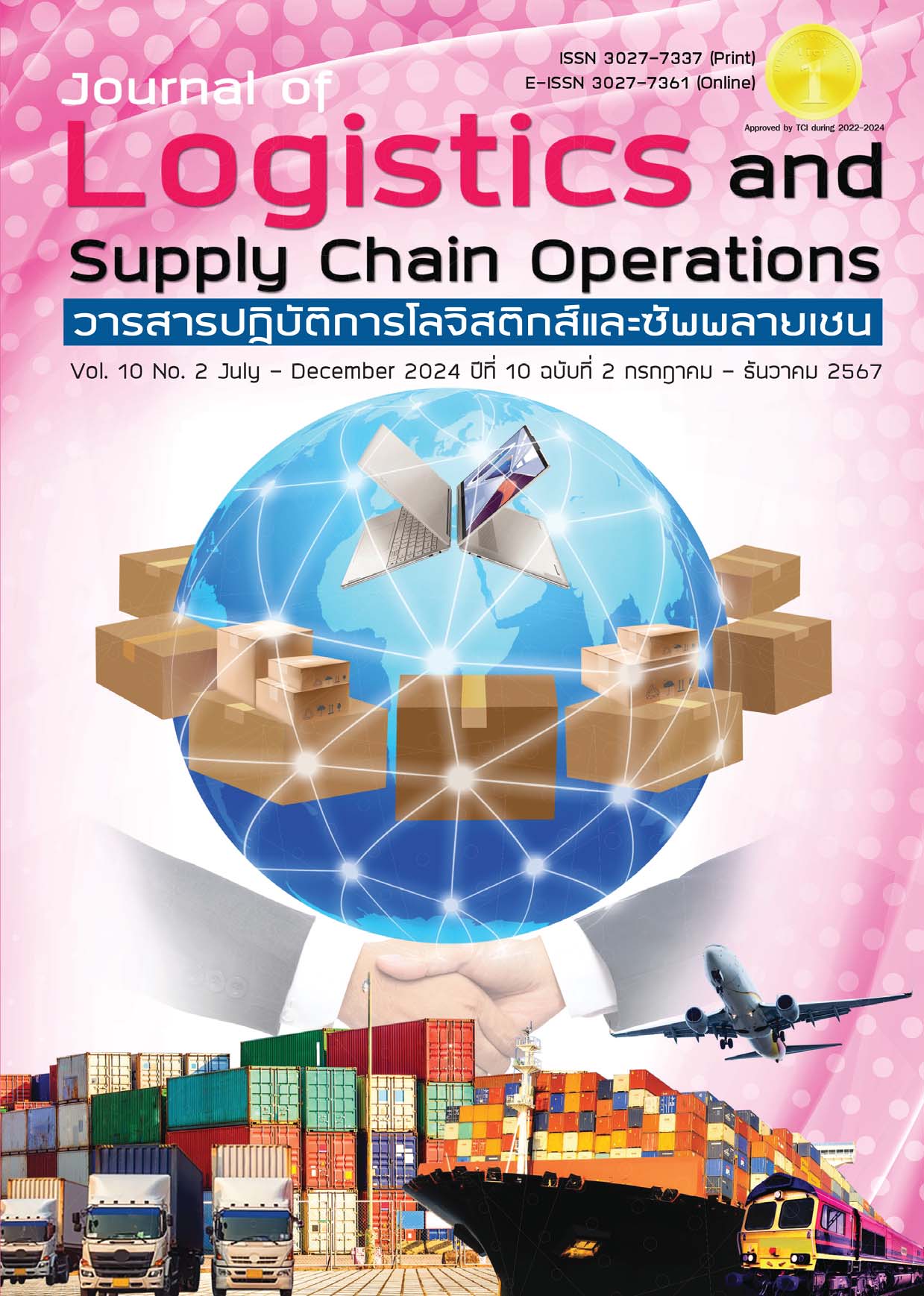ความสามารถด้านโลจิสติกส์ ความร่วมมือและความคล่องตัวซัพพลายเชนที่มีอิทธิพลต่อคุณภาพการบริการของธุรกิจพาเลทให้เช่าในประเทศไทย
DOI:
https://doi.org/10.53848/jlsco.v10i2.269201คำสำคัญ:
ความสามารถด้านโลจิสติกส์ , ความร่วมมือด้านซัพพลายเชน , ความคล่องตัวด้านซัพพลายเชน , คุณภาพการบริการ , ธุรกิจพาเลทให้เช่าบทคัดย่อ
งานวิจัยนี้มีวัตถุประสงค์เพื่อ 1) ศึกษาความสามารถด้านโลจิสติกส์ ความร่วมมือและความคล่องตัวด้านซัพพลายเชน และคุณภาพบริการด้านโลจิสติกส์ในธุรกิจพาเลทให้เช่าในประเทศไทย และ 2) ตรวจสอบความสอดคล้องโมเดลสมการโครงสร้างของความสามารถด้านโลจิสติกส์ ความร่วมมือและความคล่องตัวด้านซัพพลายเชนที่มีอิทธิพลต่อคุณภาพการบริการของธุรกิจพาเลทให้เช่าในประเทศไทย ประชากรที่ใช้ในการวิจัยครั้งนี้ คือ ผู้ทำหน้าที่ดูแลเกี่ยวกับพาเลทเช่า จำนวน 372 บริษัท ซึ่งได้มาจากการสุ่มตัวอย่างแบบเป็นระบบ ขนาดของกลุ่มตัวอย่างกำหนดตามเกณฑ์ 12 เท่าของเส้นพารามิเตอร์ เก็บรวบรวมข้อมูลโดยใช้แบบสอบถามและการสัมภาษณ์ วิเคราะห์ข้อมูลโดยใช้แบบจำลองสมการโครงสร้าง ผลการวิจัยพบว่า 1) ความสามารถด้านโลจิสติกส์ ความร่วมมือซัพพลายเชน ความคล่องตัวซัพพลายเชนและคุณภาพการบริการโลจิสติกส์ของธุรกิจพาเลทให้เช่าอยู่ในระดับที่สูง 2) ความสามารถด้านโลจิสติกส์ ความร่วมมือซัพพลายเชนและความคล่องตัวซัพพลายเชนมีอิทธิพลทางตรงเชิงบวกกับคุณภาพการบริการโลจิสติกส์ 3) ความสามารถด้านโลจิสติกส์มีอิทธิพลทางอ้อมเชิงบวกต่อคุณภาพการบริการโลจิสติกส์ โดยมีอิทธิพลส่งผ่านความร่วมมือซัพพลายเชนและความคล่องตัวซัพพลายเชน ซึ่งจากผลการวิเคราะห์โมเดลสมการโครงสร้างสอดคล้องกับข้อมูลเชิงประจักษ์ (Chi-Square = 76.505, df = 61, Relative Chi-square = 1.254, p-value = 0.087, GFI = 0.981, AGFI = 0.936, RMSEA = .026 และ RMR = .005) ผลจากการวิจัยสามารถนำไปใช้ในเชิงปฏิบัติในการพัฒนาคุณภาพการบริการโลจิสติกส์ของธุรกิจพาเลทให้เช่าด้วยการพัฒนาความสามารถในการจัดการคำสั่งซื้อที่เร่งด่วนด้วยเทคโนโลยีดิจิทัลสำหรับแลกเปลี่ยนข้อมูลกับลูกค้าที่ถูกต้อง สะดวกและรวดเร็ว พัฒนาคุณภาพพาเลทให้ได้มาตรฐานก่อนส่งมอบให้กับลูกค้า ร่วมกันพัฒนาบุคลากรด้วยการทำงานแบบคล่องตัวเพื่อให้สามารถตอบสนองตอบความต้องการของลูกค้าที่เปลี่ยนแปลงไปอย่างรวดเร็วด้วยการสื่อสารที่ถูกต้อง รวดเร็ว แบ่งปันวิธีการทำงาน ประเมินผลและนำผลมาปรับปรุงประสิทธิภาพการทำงานให้มีความยืดหยุ่นตามความต้องการของลูกค้า โดยคำนึงถึงประสิทธิภาพด้านต้นทุนพร้อมกับสร้างแรงจูงใจร่วมกันเพื่อแสวงหาประโยชน์จากการเปลี่ยนแปลงที่เกิดขึ้นและเติบโตอย่างยั่งยืน
เอกสารอ้างอิง
กองยุทธศาสตร์การพัฒนาระบบโลจิสติกส์. (2563). รายงานโลจิสติกส์ของประเทศไทยประจำปี 2562. กรุงเทพฯ: สำนักงานสภาพัฒนาการเศรษฐกิจและสังคมแห่งชาติ.
ภคพร ผงทอง. (2561). การจัดการโลจิสติกส์เพื่อสร้างความได้เปรียบทางการแข่งขันในธุรกิจพาเลทให้เช่า. วารสารมนุษยศาสตร์และสังคมศาสตร์ มหาวิทยาลัยราชพฤกษ์, 4(1), 91 100.
สุบิน ยุระรัช. (2559). การเขียนรายงานการวิจัยทางสังคมศาสตร์และมนุษยศาสตร์. กรุงเทพฯ: วิชั่นพรีเพรส.
Al Humdan, E., Shi, Y., Behnia, M., & Najmaei, A. (2020). Supply chain agility: A systematic review of definitions, enablers and performance implications. International Journal of Physical Distribution & Logistics Management, 50(2), 287-312.
Baah, C., Acquah, I. S. K., & Ofori, D. (2021). Exploring the influence of supply chain collaboration on supply chain visibility, stakeholder trust, environmental and financial performances: A partial least square approach. Benchmarking: An International Journal, 29(1), 172-193.
Bandittayarak, H., & Hotrawaisaya, C. (2021). Improving performance, logistics service quality to further enhance thecreate competitive advantage of logistics service providers: Container road transportation. Psychology and Education, 58(4), 3883-3891.
Bowersox, D. J., Closs, D. J., & Stank, T. P. (1999). 21st century logistics: Making supply chain integration a reality. Lombard, IL: Council of Supply Chain Management Professionals.
Cao, M., & Zhang, Q. (2011). Supply chain collaboration: Impact on collaborative advantage and firm performance. Journal of Operations Management, 29(3), 163-180.
Chen, C., Ren, J., & Yunga, A. (2019). Review of pallet pooling studies. Logistics & Sustainable Transport, 10(1), 1-10.
Dang, D. D., Ha, D. L., Tran, V. B., Nguyen, V. T., Nguyen, T. L. H., Dang, T. H., & Le, T. T. H. (2021). Factors affecting logistics capabilities for logistics service providers: A case study in Vietnam. The Journal of Asian Finance, Economics and Business, 8(5), 81-89.
de Campos, E. A. R., de Paula, I. C., ten Caten, C. S., Maçada, A. C. G., Marôco, J., & Ziegelmann, P. K. (2020). The effect of collaboration and IT competency on reverse logistics competency-evidence from Brazilian supply chain executives. Environmental Impact Assessment Review, 84, 106433.
Ercan, E., & Çelik, M. (2022). Logistics flexibility, relationship flexibility, and logistics service quality: The moderating role of environmental uncertainty. International Journal of Management Studies, 29(1), 1-36.
García-Alcaraz, J. L., Díaz-Reza, J. R., Montalvo, F. J. F., Jiménez-Macías, E., Blanco-Fernández, J., & Lardies, C. F. J. (2021). Effects of information sharing, decision synchronization and goal congruence on SC performance. Computers & Industrial Engineering, 162, 107744.
Hayes, R. H., & Pisano, G. P. (1994). Beyond world-class: The new manufacturing strategy. Harvard business review, 72(1), 77-86.
Hua, L., Isa, F. M., Noor, S., & Ho, R. C. (2020). The mediating role of logistics service capability on chinese logistics performance. International Review of Social Sciences, 8(1), 1-13.
Huma, S., Ahmed, W., Ikram, M., & Khawaja, M. I. (2020). The effect of logistics service quality on customer loyalty: Case of logistics service industry. South Asian Journal of Business Studies, 9(1), 43-61.
Hwang, T., & Kim, S. T. (2019). Balancing in-house and outsourced logistics services: Effects on supply chain agility and firm performance. Service Business, 13(3), 531-556.
Ismail, H. S., & Sharifi, H. (2006). A balanced approach to building agile supply chains. International Journal of Physical Distribution & Logistics Management, 36(6), 431-444.
Job, M. L., Njihia, M., Maalu, J., & Iraki, X. (2020). Reverse logistics and competitive advantage: The mediating effect of operational performance among manufacturing firms in Kenya. European Scientific Journal, 16(9), 217-237.
Lai, P. L., Su, D. T., Tai, H. H., & Yang, C. C. (2020). The impact of collaborative decision-making on logistics service performance for container shipping services. Maritime Business Review, 5(2), 175-191.
Li, X., Goldsby, T. J., & Holsapple, C. W. (2009). Supply chain agility: Scale development. The International Journal of Logistics Management, 20(3), 408-424.
Lynch, D. F., Keller, S. B., & Ozment, J. (2000). The effects of logistics capabilities and strategy on firm performance. Journal of Business Logistics, 21(2), 47.
Mentzer, J. T., Flint, D. J., & Hult, G. T. M. (2001). Logistics service quality as a segment-customized process. Journal of Marketing, 65(4), 82-104.
Morash, E. A., Droge, C. L., & Vickery, S. K. (1996). Strategic logistics capabilities for competitive advantage and firm success. Journal of Business Logistics, 17(1), 1-22.
Moutaoukil, A., Derrouiche, R., & Neubert, G. (2012). Pooling supply chain: Literature review of collaborative strategies .The Proceedings of 13th IFIP WG 5.5 Working Conference on Virtual Enterprises, PRO-VE 2012, 1-3 October 2012 at Bournemouth, UK, 513-525.
Najafizadeh, A., & Kazemi, F. (2019). The impact of reverse logistics capabilities on firm performance with mediating role of business strategy. Journal of System Management, 5(2), 225-240.
Otsetova, A. (2017). Relationship between logistics service quality, customer satisfaction and loyalty in courier service industry. Management and Education, 13(2), 51-57.
Simatupang, T. M., & Sridharan, R. (2008). Design for supply chain collaboration. Business Process Management Journal, 14(3), 401-418.
Swafford, P. M., Ghosh, S., & Murthy, N. (2006). The antecedents of supply chain agility of a firm: Scale development and model testing. Journal of Operations Management, 24(2), 170-188.
Tarigan, Z. J. H., Siagian, H., & Jie, F. (2021). Impact of internal integration, supply chain partnership, supply chain agility, and supply chain resilience on sustainable advantage. Sustainability, 13(10), 5460.
Tornese, F., Gnoni, M. G., Thorn, B. K., Carrano, A. L., & Pazour, J. A. (2021). Management and logistics of returnable transport items: A review analysis on the pallet supply chain. Sustainability, 13(22), 12747.
Uvet, H. (2020). Importance of logistics service quality in customer satisfaction: An empirical study. Operations and Supply Chain Management, 13(1), 1-10.
Zhao, M., Dröge, C., & Stank, T. P. (2001). The effects of logistics capabilities on firm performance: Customer focused versus information focused capabilities. Journal of Business Logistics, 22(2), 91-107.
Zhu, M., & Gao, H. (2021). The antecedents of supply chain agility and their effect on business performance: an organizational strategy perspective. Operations Management Research, 14(1), 166-176.



